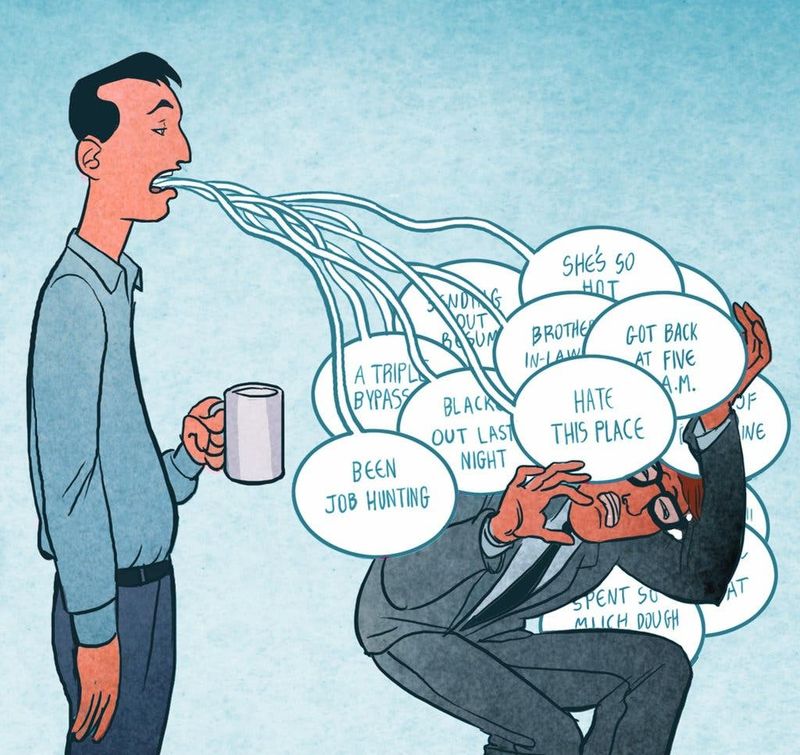Narcissists are skilled at turning seemingly innocuous behaviors into opportunities for manipulation. Understanding what makes them see others as challenges can be vital in preserving one’s mental health.
These 18 behaviors often attract toxic dynamics, as narcissists exploit their underlying vulnerabilities to gain control. Awareness and boundary-setting can prevent falling into their traps. Here are the behaviors that may make you a target.
1. Overexplaining yourself constantly
Why do we feel the need to overexplain ourselves? Perhaps it’s the desire to be understood or fear of being misjudged. However, to a narcissist, this can be seen as a vulnerability.
Imagine constantly having to justify your actions or choices. It can be draining, making you an easy target for someone who thrives on control. They see your need for validation as an opening.
Overexplaining can be perceived as a lack of confidence. Narcissists often exploit this, twisting your words to fit their narrative.
Recognize the power of brevity. Stand firm in your decisions without feeling the need to justify every detail. This can be the first step in safeguarding your boundaries.
2. Apologizing when you’re not at fault
Have you ever apologized for something that wasn’t your fault? It might seem harmless, but to a narcissist, it’s like waving a red flag.
Narcissists see unsolicited apologies as an opportunity to assert dominance. It establishes a dynamic where they are always right and you are always seeking their approval.
Apologizing unnecessarily can erode your self-worth over time. It might seem like a peacekeeping tactic, but it often backfires.
Break this cycle by recognizing when an apology is genuinely warranted. Stand your ground gently but firmly when you know you’re not at fault. This shift can prevent narcissists from exploiting your kindness.
3. Trying to prove your worth
Proving your worth is a natural tendency, especially when you care about your work or relationships. However, for a narcissist, this behavior is like catnip.
They thrive on your need for validation, using it to manipulate and control. The constant struggle to prove yourself can become exhausting and never-ending in their eyes.
Narcissists will often set impossible standards to ensure you keep trying to prove yourself. It’s a cycle that benefits them while draining your energy.
Recognize your value and achievements without needing external validation. Embrace self-assurance, and you’ll become less susceptible to a narcissist’s games.
4. Ignoring red flags to “give them a chance”
“Everyone deserves a chance,” you might think. Yet, ignoring red flags can lead to a dangerous path when dealing with a narcissist.
They often rely on your willingness to overlook their flaws, using your empathy against you. This tactic enables them to manipulate without consequence.
Over time, those red flags become harder to ignore, leading to more significant, potentially harmful, issues.
Pay attention to early warning signs. Trust your instincts. Giving chances should never come at the cost of your well-being or self-respect.
5. Over-sharing personal struggles too soon
Sharing personal stories can be a beautiful way to connect. But with a narcissist, it’s a double-edged sword.
They might initially seem empathetic, but soon those stories become tools for manipulation. Your vulnerabilities become their ammunition.
Over-sharing too quickly can lead to a power imbalance. The narcissist knows too much, while you know too little about their true intentions.
Maintain a balance. Share your stories slowly as trust develops over time. Protect your heart by being discerning about whom you confide in.
6. Believing their flattery too quickly
Flattery feels good, doesn’t it? Especially when it comes from someone charming. But narcissists use flattery as a tool.
They know that compliments can quickly build trust and lower defenses. This is where manipulation begins.
Believing flattery without question gives a narcissist the upper hand. They flatter to create dependency, making you crave more validation.
Accept compliments graciously but with caution. Analyze the motives behind excessive praise. Genuine connections are built on more than just words.
7. Tolerating small disrespect repeatedly
It starts small—a dismissive comment or a rude gesture. Tolerating these can pave the way for more significant disrespect.
Narcissists test boundaries with minor infractions, seeing how much you’ll tolerate. Each instance of overlooked disrespect emboldens them.
Repeated disrespect can wear down self-esteem and morale over time. It becomes a pattern that’s hard to break.
Address small slights early on. Assert yourself calmly but firmly to set the tone for how you wish to be treated. This curtails further disrespect.
8. Justifying their bad behavior to others
We often want to see the best in people, justifying missteps as misunderstandings. Narcissists count on this.
By excusing their behavior, you become complicit in their tactics. It fosters a dynamic where they can act with impunity.
Justifying them to others also isolates you, as friends may tire of hearing excuses for inexcusable behavior.
Hold them accountable for their actions. It’s crucial for your well-being and integrity. Encourage them to take responsibility, rather than shielding them from consequences.
9. Hoping they’ll change if you love harder
Love is powerful, but it can’t change someone who doesn’t want to change. Narcissists thrive on your hope and commitment.
The more you give, the more they take, seldom giving back. It becomes a cycle where you’re left waiting for a change that never comes.
Love should feel reciprocal, not transactional. When hoping for change becomes exhausting, it may be time to reassess.
Accept that some individuals prefer the status quo, and your love alone won’t transform them. Seek relationships where love is mutual and nurturing.
10. Being overly forgiving
Forgiveness is a virtue, yet when extended too liberally, it can be exploited. Narcissists often rely on endless forgiveness to escape accountability.
Being overly forgiving can lead to a cycle of repeated offenses. Each forgiveness reinforces their behavior.
Narcissists use your kindness to their advantage, knowing you’ll forgive them regardless of their actions.
Set clear limits on forgiveness. It should be based on genuine remorse and change, not manipulation. Protect your kindness by establishing boundaries.
11. Avoiding confrontation at all costs
Confrontation is uncomfortable, but avoiding it can empower a narcissist. They exploit your fear of conflict to maintain control.
Without confrontation, issues fester. The narcissist’s behavior goes unchecked, reinforcing their dominance.
Avoidance can lead to a buildup of resentment, negatively impacting your mental health and relationships.
Learn to face conflicts calmly and assertively. Address issues directly when they arise to prevent them from escalating. This empowers you and prevents manipulation.
12. Sacrificing your boundaries to keep peace
Maintaining peace is admirable, but not at the expense of your boundaries. Narcissists exploit those who consistently put others first.
When you sacrifice your needs, it signals that their desires matter more. This creates an imbalance, allowing them to dictate terms.
Over time, this erodes your self-worth and autonomy. Your life becomes dictated by their whims.
Reinforce your boundaries, even if it disrupts the peace temporarily. Healthy relationships respect those limits and encourage mutual understanding.
13. Letting guilt guide your choices
Guilt can be a powerful motivator, but it shouldn’t dictate your decisions. Narcissists wield guilt to control your actions.
They play on your conscience, making you feel responsible for their happiness or failures. This tactic keeps you in a cycle of compliance.
Over time, guilt-driven choices can lead to resentment and regret, impacting your mental health and relationships.
Recognize when guilt is being used as a tool. Make decisions based on your values and well-being, rather than external pressure.
14. Trying to “fix” their problems for them
Fixing problems is commendable, but not when it comes to managing a narcissist’s life. They use this tendency to offload responsibility.
By solving their problems, you inadvertently enable their behavior. It sets a precedent where they rely on you instead of taking responsibility.
Narcissists exploit your helpful nature, knowing you’ll step in when things go awry.
Encourage them to face their challenges and learn from them. Support doesn’t mean solving everything for them. It’s about empowering them to grow independently.
15. Being too available too soon
Availability signals interest, but being too available can be perceived as desperation. Narcissists exploit this eagerness.
They use your willingness to drop everything as a means to control and dictate the pace of the relationship.
Over time, this availability can lead to an imbalance, with you always on their terms.
Pace yourself in new relationships. Allow time for mutual interests to develop naturally. Valuing your time sets a standard for how you wish to be treated.
16. Letting them isolate you subtly
Isolation can be subtle, creeping into your life slowly. Narcissists often isolate you from loved ones, increasing their influence.
They may criticize your friends or family, creating doubt about your relationships. This seclusion gives them more control.
As isolation deepens, it becomes harder to seek the support needed to break free from their grasp.
Stay connected with your support network. Recognize any attempts to isolate you and address them promptly. Healthy relationships encourage independence.
17. Equating drama with passion
Drama can be intoxicating, often mistaken for passion. Narcissists use this confusion to keep you engaged.
They create chaos to maintain your attention and emotional involvement. It’s a cycle that feels passionate but is ultimately exhausting.
Over time, drama can become a substitute for genuine connection and stability.
Recognize the difference between passion and chaos. Seek relationships that offer excitement without constant turmoil. This ensures a healthier dynamic.
18. Trusting words over consistent actions
Words can be enticing, but without actions, they lose meaning. Narcissists often make grand promises without follow-through.
They rely on charming words to maintain their facade, knowing you’ll hold onto hope rather than questioning their actions.
Trusting words over actions can lead to disappointment and disillusionment.
Pay attention to patterns rather than promises. Consistent actions speak louder than any words. Trust is built on reliability, not rhetoric.



















